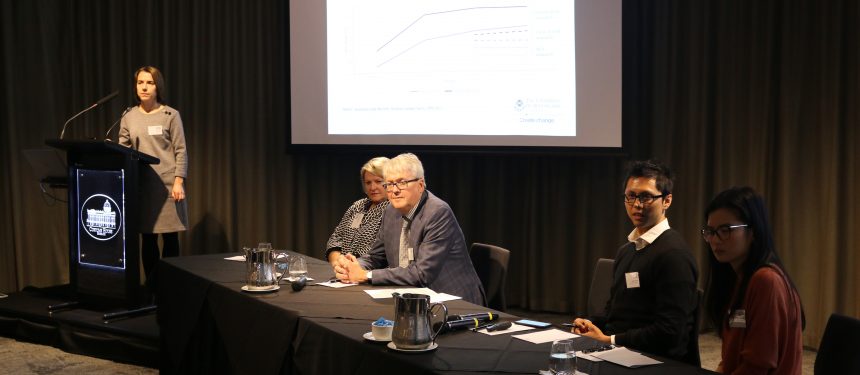Increasing international student numbers outside metropolitan areas could be where the Australian education industry’s growth potential lies, delegates were told at the recent IEAA Mid-Winter Research Seminar in Brisbane.
News and business analysis for Professionals in International Education
Have some pie!
Australia eyes regional growth over city squeeze
 Australian international educators making the case for increasing students in Australia's regional areas. (L-R): Cate Gribble, Janelle Chapman, Kevin Brett, Francisco Rowe and Angelina Zhi Rou Tang. Photo: The PIE News
Australian international educators making the case for increasing students in Australia's regional areas. (L-R): Cate Gribble, Janelle Chapman, Kevin Brett, Francisco Rowe and Angelina Zhi Rou Tang. Photo: The PIE News The comments, which were made during a session on the benefits of international students to Australia’s regions, urged providers to consider developing further opportunities for students in regional areas and make the most of the unique selling points available outside capital cities.
“The strongest opportunity to grow is in the regions,” TAFE Queensland director international Janelle Chapman told delegates.
“There will come a point where we won’t have the space to have infinite growth in international students”
Chapman, whose institution has several campuses outside Brisbane, said regional areas had several unique propositions for international and domestic students, such as geological and industrial opportunities, and finding a way to promote those could see significant growth for the education industry.
According to Department of Education and Training data, there is significant room for expansion within regional Australia, with less than 5% of the international student population located outside a capital city in 2015.
Chapman told The PIE News this over-reliance on the main cities created capacity issues which would force students away sooner or later.
“There will come a point where we won’t have the physical space to have infinite growth in international students [in metropolitan areas],” she said.
Australia’s shortage of purpose-built student accommodation was also mentioned in discussions as increased prices cause headaches for students in capital cities.
Research on skills shortages in Australia highlighted during the seminar found a significant employment boost, highlighting one of the benefits to students choosing a regional provider.
Researchers Francisco Rowe and Angelina Zhi Rou Tang found graduates who studied and remained in non-metropolitan areas were not only more likely to be in full-time employment four months after completion of studies but also more likely to be in a job that matched their qualification.
About 65% of regional graduates who remained had a job related to their field of study, compared to less than half of those in metropolitan areas.
Whether this tendency will continue was uncertain, however, as the findings came with a dire warning that rates of employment and qualification match had been slipping around Australia over the past decade.
Regardless, Rowe also said regions themselves should be actively trying to attract more international students, as the evidence showed there was a positive impact on skills shortages.
“Regional areas, even though they are often getting a small percentage [of students], are getting a substantial injection to skills knowledge,” he said.
Educators who move away from the capital cities could also be providing students with better educational outcomes, according to the findings of a different study comparing the international student experience in metropolitan and regional cities.
Kevin Brett, who compiled the report for benchmarking company i-graduate, said generally there was no difference between the overall experience in regional and metropolitan areas, however, students who chose to study with a regional provider stated that they received a better educational experience.
This benefit, he said, was unlikely to be felt by students because of differences in academics and more likely caused by smaller student populations creating reduced class sizes and increasing a student’s face-to-face time with their lecturers and tutors.
Still looking? Find by category:


